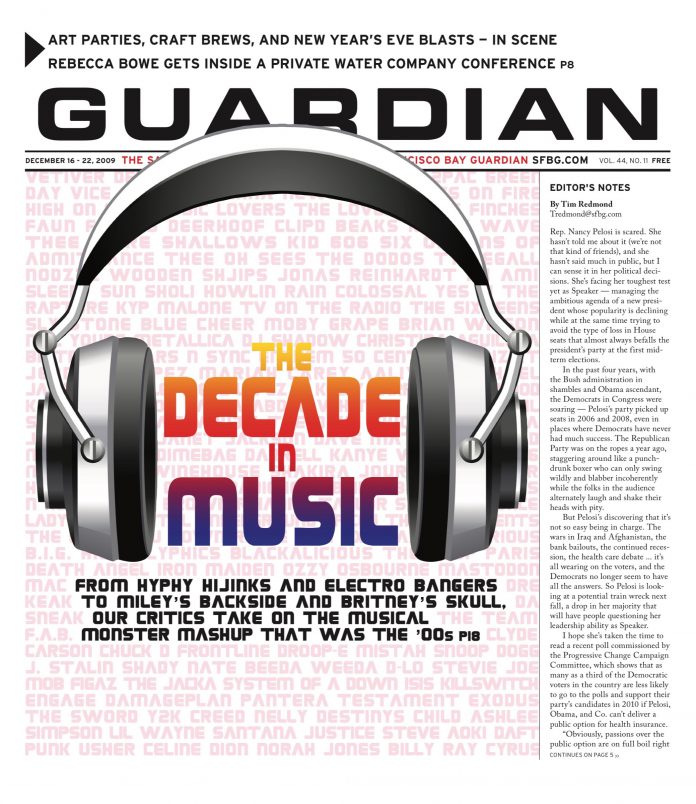Tredmond@sfbg.com
Rep. Nancy Pelosi is scared. She hasn’t told me about it (we’re not that kind of friends), and she hasn’t said much in public, but I can sense it in her political decisions. She’s facing her toughest test yet as Speaker — managing the ambitious agenda of a new president whose popularity is declining while at the same time trying to avoid the type of loss in House seats that almost always befalls the president’s party at the first midterm elections.
In the past four years, with the Bush administration in shambles and Obama ascendant, the Democrats in Congress were soaring — Pelosi’s party picked up seats in 2006 and 2008, even in places where Democrats have never had much success. The Republican Party was on the ropes a year ago, staggering around like a punch-drunk boxer who can only swing wildly and blabber incoherently while the folks in the audience alternately laugh and shake their heads with pity.
But Pelosi’s discovering that it’s not so easy being in charge. The wars in Iraq and Afghanistan, the bank bailouts, the continued recession, the health care debate … it’s all wearing on the voters, and the Democrats no longer seem to have all the answers. So Pelosi is looking at a potential train wreck next fall, a drop in her majority that will have people questioning her leadership ability as Speaker.
I hope she’s taken the time to read a recent poll commissioned by the Progressive Change Campaign Committee, which shows that as many as a third of the Democratic voters in the country are less likely to go to the polls and support their party’s candidates in 2010 if Pelosi, Obama, and Co. can’t deliver a public option for health insurance.
"Obviously, passions over the public option are on full boil right now," blogger Greg Sargent wrote in his report on the poll in the Plum Line. "Passage of a health care bill of some kind, not to say the passage of time, could reduce the impact that dropping the public option could have on Dem turnout in the 2010 elections, particularly since they’re nearly a year away.
"But these numbers are a reminder of just how dispirited the Dem base is by the party’s inability to leverage their comfortable majority in support of an agenda built on core liberal priorities."
See, the danger for Pelosi and the Democrats isn’t that a few swing seats in traditionally Republican districts will shift away from the D column. It’s that millions of Democrats, particularly young, motivated, idealistic Democrats who worked their asses off to get Obama elected, and partied in the streets when he won, will give up next year and stay home.
That will have an impact on key Senate races, key House races, and races for governor in dozens of states (including California). The party’s activist base didn’t just help elect the president last fall; those organizers and campaigners gave Pelosi her powerful majority and bolstered the Democrats’ control of the Senate. And their efforts trickled down to the state and local level.
But we’re unhappy now. Afghanistan has us wondering what Obama’s idea of change really is — and a health care bill that caters to the private insurance industry is going to make it hard to get any of us motivated next year. We all know the difference between the Democrats and Republicans, and we’re not naive idiots who are going to vote the wrong way out of spite. But we might not fight so hard next time around — and for Pelosi, that would be a serious problem.

